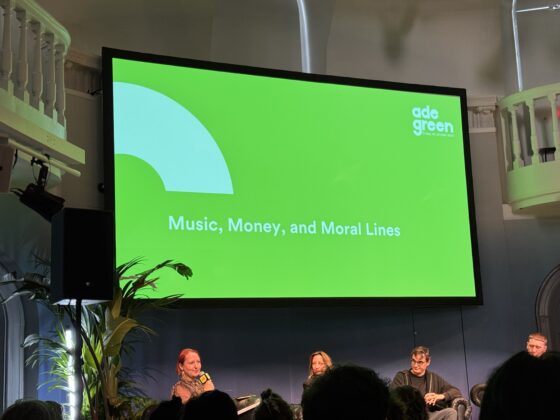ADE speakers outline the Middle East conflict’s impact on music
Senay Boztas
The situation in the Middle East is having a financial impact on the music industry, with pro-Palestinian artists cancelling on festivals whose funders have been linked to Israel and others reporting cancellations by venues.
A talk at the Amsterdam Dance Event conference on Friday heard that the DGTL global art and music festival brand has seen a number of artists pull out since its parent company was acquired by private equity firm Kohlberg Kravis Roberts & Co (KKR) last year.
“We had our first cancellation about one and a half weeks before a DGTL festival last April,” said director Ellen Evers. “We had a very open and respectful conversation with them. They decided to do this quietly and not publicly…It’s not that easy any more to just book artists, so you have to have way more calls and emails, you get a lot of questions, and we just try to be open and transparent.”
A number of Dutch festivals including DGTL said publicly that they were unhappy with the change in ownership, after it emerged that former owner British Superstruct Entertainment had been taken over, while dozens of musicians and DJs have boycotted music festivals over KKR’s alleged links to Israel.
Henk Willem Smits, financial and economic journalist at investigative platform Follow the Money, said that while KKR was not mentioned in the UN special rapporteur’s report “from economy of occupation to economy of genocide”, it has faced criticism.
“KKR is mentioned by pro-Palestinian activists because they [KKR] invest in companies that are involved in renting out property in the West Bank, they invest in Israeli tech companies…it’s very intertwined in the whole of the community,” he said.

The talk was hosted by Ruth Daniel, CEO of a charity that runs music events in war-torn places, In Place of War, who said the conflict in the Middle East is reflected in a cultural battle.
“More and more when artists use their voices, [they can] be cancelled, shut down, or have success with that,” she said. “We’re seeing platforms being taken over by corporate structures and what does that mean in terms of their independence?”
According to Evers, the takeover by KKR has not interfered directly with day-to-day management. “The mental health of our team is nothing compared to what people go through every day in Gaza on a daily basis… but, that said, it does have an impact on our mental health as well,” she said.
“We really identity with the core values of the DGTL festival. Then, suddenly, overnight, you get questions about your moral lines, comments online, [at] birthday parties, dinners, festivals, or even once in a sauna by a person I didn’t know at all. It does have a lot of impact.”
Artists taking an outspoken pro-Palestinian stance face financial consequences, according to Dan Lambert, manager of the Irish band Kneecap. The band has been banned from performing in Hungary and Canada and rapper Liam Óg Ó hAnnaidh faced a terrorism charge for allegedly displaying a flag in support of proscribed terror organisation Hezbollah at a gig – a case dismissed on a technical error this month.
According to Lambert, the band’s pro-Palestinian position was related to growing up in a west Belfast marked by the Troubles. “The threat is to remove your ability to access finance,” he said.
“Kneecap don’t value financial return above their own integrity, and they never will…When the gigs are being cancelled, they can handle that. Even when there was a huge pile on with the prime ministers, presidents, the British state, police, judges…they never once cared about the financial element.”
He said, while the band felt the response to its critical stance on Israel was disproportionate, “it becomes very serious when you enter a courtroom and behind a wall of glass…But they have mainly been able to cope with their community’s support.”
Bankrupt
When the band and others boycotted the South by Southwest (SXSW) festival in Texas due to its links to the US military in 2024, the Irish government compensated them, according to Lambert. “I was conscious there were other acts [for] whom this could be financially really problematic,” he said.
“Ireland sends the artists, so no-one went, Ireland didn’t send anybody – the only country that had ever done that – and the Irish government paid everyone. But that’s the support of the Irish government…a Scottish [artist] didn’t want to go but couldn’t not go because financially she would have been bankrupt.”
Evers said that the impact on her festival is more emotional. “We just sit together, every three weeks, with the team in a circle and we just express ourselves about how we feel at the moment – and every week is different,” she said. “And not only the impact of the situation with KKR but with the rest of the world and what’s going on.”
Superstruct told The Guardian earlier this year that it is “horrified by the scale of suffering in Gaza” and is independently run. Dutch News has asked Superstruct and KKR for comment.
Thank you for donating to DutchNews.nl.
We could not provide the Dutch News service, and keep it free of charge, without the generous support of our readers. Your donations allow us to report on issues you tell us matter, and provide you with a summary of the most important Dutch news each day.
Make a donation